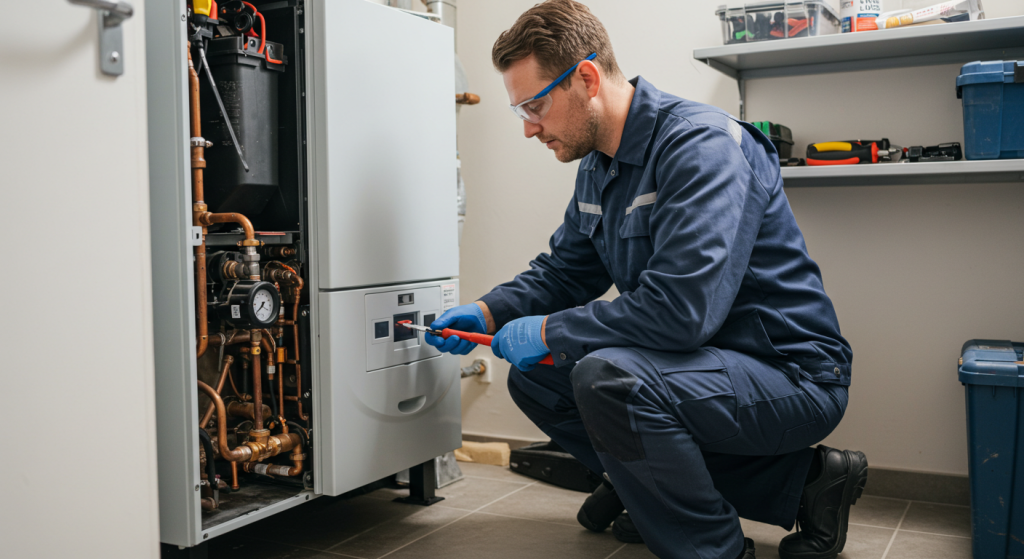At Obie Comfort Solutions, we understand the stress a boiler breakdown can cause, especially during cold weather. As a family-owned HVAC provider serving Framingham, MA, and Greater Boston since 2006, we’re here to guide you through the necessary steps to ensure your home remains safe and warm.

Key Takeaways
- Perform immediate checks on gas, power, and water supplies to rule out common issues.
- Monitor boiler pressure and address unusual noises or error codes to prevent further problems.
- Engage a qualified professional for persistent issues and consider boiler cover for added protection.
Immediate Checks After Your Boiler Breaks Down
Verify Gas Supply
- Check Other Appliances: Ensure other gas appliances, like the stove or fireplace, are functioning.
- Inspect the Shut-Off Valve: Confirm the gas valve is open.
- Contact Your Gas Supplier: If no gas appliances are working, there may be a supply issue.
Check Power Supply
- Inspect the Display: Ensure the boiler’s digital display is active.
- Check the Fuse Box: Look for tripped breakers or blown fuses.
- Persistent Issues: If the power appears fine but the boiler won’t turn on, consult a licensed technician.
Assess Water Supply
- Test Water Flow: Check if water flows from your taps.
- Supply Interruptions: Contact your water provider if there’s no flow.
- Monitor Boiler Pressure: Low or high pressure can prevent proper operation.
Inspecting Boiler Pressure
Boiler pressure is essential for efficient operation. Most boilers function best between 1 to 1.5 bar. Check the pressure gauge and address any irregularities:
Low Boiler Pressure
- Solution: Repressurize the boiler by opening the valves beneath it to add water until the gauge reaches the recommended level.
- Caution: Avoid overpressurizing, which can cause additional problems.
High Boiler Pressure
- Solution: Bleed radiators or carefully drain water from the system to release excess pressure.
- Professional Help: Persistent high pressure may require expert attention.
Troubleshooting Common Boiler Problems
No Heat or Hot Water
- Check Thermostat Settings: Ensure it’s set correctly and has functional batteries.
- Inspect the Pilot Light: Relight it according to the manufacturer’s instructions if it’s out.
- Verify Pressure Levels: Ensure the boiler’s pressure is within the optimal range.
Unusual Noises
- Gurgling: Indicates air in the system or low water pressure.
- Whistling or Kettling: Suggests limescale buildup or restricted flow.
- Action: Persistent noise requires professional inspection.
Error Codes
- Solution: Refer to the boiler manual for error code explanations or check the manufacturer’s website for troubleshooting guidance.
Dealing with Frozen Condensate Pipes
Frozen condensate pipes can cause the boiler to shut down as a safety measure.
Thawing the Pipe
- Warm Water: Gently pour warm (not boiling) water over the pipe or use a hot water bottle.
- Reset the Boiler: Once thawed, reset the system to restore functionality.
Preventative Measures
- Insulate Pipes: Use foam insulation to protect against freezing.
- Reposition Pipes: Move pipes away from cold areas or add heating tape for extra protection.
When to Call a Professional
Some boiler issues require expert assistance to ensure safety and proper repairs.
Gas Safe Registered Engineer
- Always contact a Gas Safe registered engineer for gas boiler issues to ensure compliance with safety standards. Verify credentials before work begins.
Emergency Situations
- Smell of Gas: Contact the National Gas Emergency Service immediately.
- Major Leaks or Damage: Shut off the boiler and call for emergency repairs.
Utilizing Boiler Cover and Warranty
Having boiler cover or an active warranty can save time and money during a breakdown.
Checking Your Warranty
- Duration: Warranties typically last 2–10 years.
- Authorized Repairs: Use the manufacturer’s service providers to avoid voiding the warranty.
Benefits of Boiler Cover
- Covers repair costs, emergency call-outs, and annual servicing.
- Provides peace of mind by reducing unexpected expenses.
Preventive Maintenance Tips
Regular care minimizes breakdown risks and extends your boiler’s lifespan.
Annual Servicing
- Schedule professional tune-ups to clean, inspect, and maintain your boiler.
DIY Maintenance
- Bleed Radiators: Remove trapped air to improve heating efficiency.
- Check for Leaks: Regularly inspect the boiler and pipes for visible leaks.
- Monitor Pressure: Adjust the pressure gauge as needed.
Summary
Knowing what to do when your boiler breaks down can save time, money, and stress. Here’s a quick recap:
- Immediate Checks: Inspect gas, power, and water supplies.
- Troubleshoot Common Issues: Address pressure irregularities, frozen pipes, or error codes.
- Call a Professional: Engage a Gas Safe registered engineer for persistent or serious problems.
- Preventive Care: Commit to annual servicing and regular maintenance.
Contact Obie Comfort Solutions today for reliable boiler repair and maintenance services. Let our certified professionals keep your home warm and safe, no matter the season.
Frequently Asked Questions
What should I do if my boiler breaks down?
Start by checking gas, power, and water supplies. Inspect boiler pressure and troubleshoot common issues. If unresolved, call a professional.
How do I check the gas supply to my boiler?
Verify other gas appliances are working and ensure the gas shut-off valve is open. If issues persist, contact your gas supplier.
What does low boiler pressure mean, and how do I fix it?
Low pressure can prevent the boiler from functioning. Adjust by carefully repressurizing the system using the valves beneath the boiler.
When should I call a professional for boiler issues?
Contact a professional for persistent issues, leaks, or gas-related problems. Always hire a Gas Safe registered engineer for gas boiler repairs.
How can I prevent my condensate pipe from freezing?
Insulate exposed pipes, ensure proper positioning, and clear obstructions during cold weather to maintain flow and prevent freezing.
